More actions
| Ailor | |
|---|---|
 | |
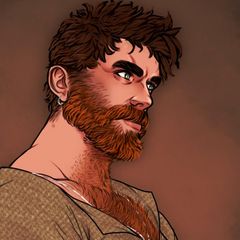 | |
| Nation State | Many |
| Ruler | Varied |
| Languages | Primarily Common |
| Religion | Unionism, Fornoss, Draconism |
| First Recorded | Unclear |
| Demonym(s) | Ailor |
Ailor is a term that describes a vast range of people with no clear single heritage origin, but who all developed around the same time. Aloria's analog for Humans, the Ailor are Aloria's most numerous people by sheer virtue of populating the majority of the world's landmasses, and their comparatively shorter lives to those of other heritage, causing their population numbers to explode in short periods. To many other societies, the Ailor were barely on the radar for thousands of years. Despite their huge numbers, for most of history, they were the uncounted footnote, often an entity to be acted upon, rather than setting the stage for the global empires of old. The world-altering event that was the Cataclysm changed the global foodchain, propelling the Ailor to the top with the newly established Regalian Empire, which would grow to become the world's greatest superpower. The majority of the Roleplay occurs in the capital of the Ailor people, Regalia.
Design
Ailor, being the closest analog to a "Human" as seen in other lore universes, are considered the jack-of-all-trades. They do nothing quite as exceptional as the other peoples of Aloria. While they can learn Magic, rarely does an Ailor become as good a Mage as a Lanlath Elf. While Ailor use technology often, rarely do they have the unique technological gift of the Skyborn. While Ailor fleets command the high seas with military power, an Ailor could not compete with a Fin'ullen Elf while fighting submerged in water. They are the average middle ground between all people, capable of all things but having no specific gift for anything but court politics and intrigue, and an uncanny ability to create further divisions among themselves. It should be noted that Ailor can have any visual appearance real-world people can have independent of their parentage or ethnicity. Genetics work differently in Aloria, with inherited traits often being more about demeanor, rather than skin/hair/eye color or ethnic grouping.
Cultures
Ailor are some of the most fractured people on Alogia, always creating "us versus them" mentalities and othering based on societal divisions. As a result, there are dozens of cultures, but a selection of the ten most prominent is displayed below for ease of character creation. Note, that while some have implicit Religions attached, Religion is a separate matter from Culture, and so it is possible to choose a different Religion. There exists a lot more optional Expanded Lore (linked below) on the cultures, but this is not necessary reading material for character creation.
|
Cearden Ailor are the largest culture group, spanning several continents and making up the bulk of the population of the Regalian Empire. The Cearden are renowned traders and craftsmen, but are also generally seen as jack-of-all-trades, meaning they are a good default option for those trying out Ailor. Cearden are based on a wide range of English-speaking renaissance to regency-era culture speaking Common (English). |
Ithanian Ailor are the most powerful political cultures among the Ailor, hailing from the Ithanian Kingdom and being most dominant in the wealthy upper classes of the Regalian Empire. The Ithanians are sophisticated trendsetters, creating fashion styles and protocols while they dictate court culture. Ithanians are based on a wide range of French-speaking renaissance to Napoleonic cultures speaking d'Ithanie (French). |
|
Wirtem Ailor make up the majority of the military in the Regalian Empire, from the low foot soldier to the gold-medalled generals and tacticians. The Wirtem culture has a long history of conservatism in the Regalian Empire, and leaning towards martial and pious customs. The Wirtem are based on a wide range of German-speaking late medieval to early Prussian cultures speaking Wirtem (German). |
Anglian Ailor hail from Anglia, the grain basket of the Regalian Empire. Anglians are peasants through and through, serving their lords as loyal serfs, or as archers. The Anglians are honest folk, food and drink loving, and with an air of mysticism due to their adherence to Draconism as a Religion. Anglians are based on a wide range of low-land (Dutch, Belgian) early medieval cultures speaking Anglian (Dutch). |
|
Breizh Ailor hail from the fabled kingdoms of Kintyr, an eclectic mix of petty kingdoms in a near constant state of war with one another, contrasting the tranquility of the monasteries and nunneries that dot the landscape. The Breizh are famed builders of bastion forts, knights, and people of faith. The Breizh are based on a wide range of Welsh/Breton Celtic early medieval cultures speaking Laithgar (Welsh). |
Cantaluna Ailor hail from the powerful provinces of Vultaro and Montania, an center of power in the Regalian Empire under the Iron Duke. The Cantaluna are a culturally rich people with expressive statues, evocative music, and masterwork paintings. Their Engineers are also famed across the world in the fields of science. The Cantaluna are based on late renaissance Italian cultures speaking Cantaluna (Italian). |
|
Velheim Ailor are the most widespread culture, present on nearly every continent. With an ancient history in the Pagan faith of Fornoss, the Velheim spread across the world long before the Regalian Empire existed, becoming famed warriors, hunters, sailors, and navigators in the maritime tradition. The Velheim are based on early medieval to late renaissance Norse cultures speaking Skodje (Norwegian). |
Tierravera Ailor have built a passionate culture out of the ruined eastern provinces of the Allorn Empire, creating a freedom-loving and fiercely libertarian culture that while being part of the Regalian Empire, resists its autocracy at every turn. From the plantations to the guerillas, the Tierravera call of freedom can be heard far. They are based on colonial-era Spanish cultures speaking Tierravera (Spanish). |
|
Krainivaya Ailor have sailed from lands afar many years ago to seek shelter in the Regalian Empire, founding some of the most pious heartlands of faith within it. The Krainivaya live simple lives, but when called to faith answer the call like no other in the war against Demons and Vampires, serving as priests and holy warriors. Krainivaya are based on early-medieval to late Ukrainian cultures speaking Krai (Ukrainian). |
Regal Ailor are the fuel of the Regalian Empire, bureaucrat and diplomat classes that keep it running. The Regal culture is artificially adopted later in life, a patriotic idea that dismisses cultural division in favor of state obedience and respect and equity for all. As such, it is not based on any particular culture but to serve the Regalian Empire as efficiently as possible. They mostly speak Common (English). |
For a more in-depth analysis of the Ailor Cultures, as well as some additional cultures not mentioned here like the Amal Culture, Aetosians (Byzantine Greek), or various pre-Empire pagan Cultures, see the Ailor Cultures Page. This page is still heavily under development. Reading this page is not necessary in character creation, it may offer some additional insights and cultural niches used by various cultures however.
Heritage Traits
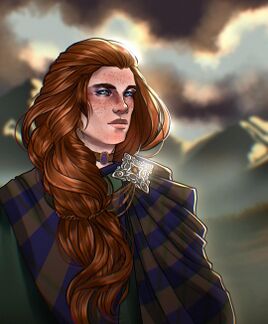
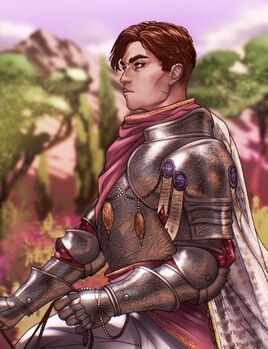
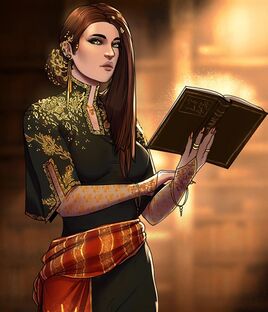
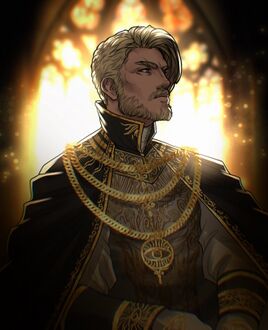

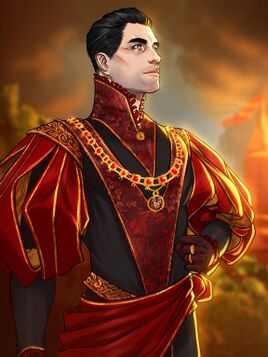
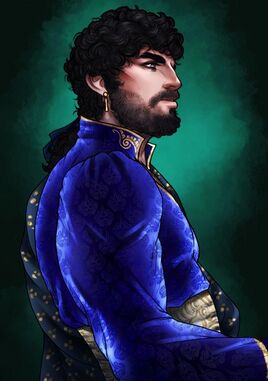

In Character Design, Proficiency allows for the buying of Packs, which give Combat Abilities. Heritage Traits add free Packs and Mechanics to a Character, fit around cultural themes. Mechanics are flair and roleplay opportunities Characters have outside of Combat, while Packs are Combat Power. Free Magic Packs can always be defined as any Alignment. Mixed Heritage Characters (characters of two different culture parents) choose one set of Free Packs, and can mix and match Mechanics from both parents up to a maximum of 5 Mechanics.
Mechanics
- Ailor are masters of languages, which is expected given their habit to culturally divides. Because so many of their languages are inter-connected, various words become more obviously related, and they also take more effort to learn other languages. If someone insults an Ailor, even in a language they do not speak, the Ailor would know, as they know most curse words or words by which to speak ill of others in all languages.
- Ailor are the masters of the Regalian Empire, and while it has equality between all peoples and heritages, Ailor are just by virtue of being Ailor considered preferential for most government positions and judicial situations. Where possible to do with the Nobility, with Government, or with Palace decisions, Ailor will be treated preferentially over other peoples, even if their qualifications might be lesser than the other options.
- Ailor when using Syncretism can worship up to 3 Gods of their sub-dominant Religion, instead of just 1 or 2. Additionally, when Syncretizing, they gain the Mechanic of the sub-dominant Religion (except for Evolism, where only one of the Mechanics can be chosen). If your Character does not Syncretize, they gain +1 Attack Stat (Breaking Cap up to 11) against Characters that have Syncretized their mono-faith.
Religions
- Unionism: Unionism is the most common Religion followed by the Ailor, and it is also the most recent one, only being 300 years or so old. Unionism is a Religion that proposes that global paradise will arrive when the Regalian Empire dominates the whole world, and because most Ailor live in the borders of the Regalian Empire, the two connect well.
- Draconism: Draconism is one of the smallest minority Religions among the Ailor, but still one that is going strong. Draconism is exceptionally hard to root out among the Ailor, because the Dragons always seem to have treated them more preferentially than other peoples of Aloria, guiding and helping the development of many of their cultures over the centuries.
- Estelley: Following Estelley as a Religion is a bit strange for an Ailor because it is mostly an Elf ethno-Religion, and because the Elves spent millennia terrorizing Ailor countries with repeat raids for wealth and power. Still, Estelley brings a strong message about inner perfection that some Ailor who live among a lot of Elves may find appealing.
- Fornoss: Fornoss is the second (and once largest) Religion of the Ailor. The Fornoss Religion continues to be strong especially in the north, as the original Fornoss believers were the first Ailor to truly venture far beyond their native homelands and colonized many corners of the world. It continues to have a strong presence even in the mostly Unionist Regalian Empire.
- Evolism: Evolism is an unusually popular minority Religion among the Ailor. As the Regalian Empire grows and expands, the individual becomes more of a faceless nameless gray entity in a crowd, indistinguishable from the other averages. The Dark Gods answer, allowing an Ailor to become exceptional, powerful, famous and feared, at the expense of their obedience.
- Khama: While Khama was largely an ethno-Religion for most of its existence, it has recently become more open to outsiders, and so some non-Asha are converting to it. The numbers are still minuscule, but with a more articulated central message, Khama is capable of competing for converts with the other minority Religions.
- Minor Faiths: Due to the cultural and historical variance among the Ailor, Pagan Cultism is alive and well especially in the more isolated corners of the Empire. Ailor make up the bulk of most of the smaller Pagan Faiths and Cults that exist around the world, just because of difficulty other major world Religions have at inspiring the hinterlands to follow their dogma.
History
The Homeland Era
The Homeland Era is a period that refers to when the Ailor largely lived on Ceardia and other immediately adjacent land masses. This period was likely either shortly after the fall of the Meraic Empire or some millennia before the rise of the Allorn Empire. Ailor have likely been around for some time longer than most people of Aloria in the present era, however their initial progress was extremely slow due to their short (comparative) life spans, and their extremely violent culture. The Homeland Era is sometimes also referred to as the Warlord Era, as this was a period in which most of Ailor society was perpetually stuck in never-ending border conflicts with regional warlords and petty despots. There are an uncountable amount of cultures that rose and perished in this period, until the sudden arrival of the Proto-Velheim who would later form the core of the Fornoss worshiping people. At around the same time, the ancestors of the Skyborn diversified from their common Ailor ancestor, and became the first founders on Ard-al-Nur, thus no longer being Ailor.
The Pearl Wars
After the Proto-Velheim started mass-colonizing the world, a long period that coincides with Elven and Asha history referred to as the Pearl Wars or the Elven Terror. This was a period spanning some millennia after the Dewamenet-Allorn War, and the subsequent defeat of the Asha. As the Pearl Wars accelerated against the Asha, fleeing Asha populations moved into Ailor territories, which in turn put the Ailor in contact with the Elves. There is a shared tragedy between the Ailor and the Asha, in that many of the same areas where Asha were repeatedly attacked with vile Oblation Magics, the Ailor who lived close by and sometimes even intermingled also became a target. While Oblation Magic required specific conditions to be met to work on the souls of the Asha, it was easier to apply to the Ailor, who had such varied Religions that they sometimes just did not have afterlives, or were some version of early agnostic, thus not having any faith at all. It should be expressed that the Asha by far suffered greater under this historical event than the Ailor, as the campaign by the Elves was designed to exterminate their people and culture, but Ailor often were caught up in the crossfire, and faced raids just as well. For every three raids on Asha population centers, Ailor also faced a raid on theirs, with Elven fleets ranging as far as Ceardia, Ard-al-Nur, and the landmass that would later become the Regalian Archipelago. During this period, large migratory movements of people also occurred, which is why the Ailor are so genetically diverse in the modern era. While originally skintone and hair color and eye color defined where someone came from, over time the mixing of these people made visual traits effectively universal. There remain legends of "the arrival of the black-haired people from the south", millennia ago, a point after which those populations mixed, and henceforth any Ailor could have black hair. The Pearl Wars did not invoke a historical trauma for the Ailor like it did for the Asha, notably because their average life span in this period was four times as short as an average Asha who could survive the Pearl Wars, so the events were quickly forgotten, though a communal distrust of Elves remained. When the Pearl Wars ended, Ailor population counts recovered fairly quickly, and exploded after the Cataclysm.
The Regalian Era
The Cataclysm defines the 0 year dating event during which much of the world's geography was changed due a series of natural calamities. These earthquakes, volcanoes, and tsunamis were the consequence of a massive Magical event at the end of a failed Void Invasion elsewhere in the world, and it utterly wrecked most of the western world's surface (sparing the Sihai lands). The Allorn Empire was destroyed, and with their most prominent obstacle to glory being eliminated, the Ailor were free to expand and form larger contiguous states. In the year 5 AC the Regalian Empire was founded after the Five Family Rebellion against a local Elven state, during which Solvaan Elves. Eronidas, Ailor, and Narim came together to defeat the local tyrants and found the Regalian Empire under the leadership of the Ailor. Regalia continued to grow for the coming 3 centuries into the world's largest but often at times unstable Empire and the central focus point of world politics. This era is largely defined for each state by whether or not they are part of the Empire, subject to it, or fight against it.
Expanded Lore
Expanded Lore exists to apply more content and deep-lore exploration. This section is optional reading that is not needed for a good experience, though if you play a Scholar of a kind, reading this is encouraged.
Regalia the City
Regalia is the capital of the Regalian Empire. Why the city and the Empire are named the way they are is unknown, though it was likely a happenstance, as most of the Regalian Empire at the time of its founding was either trival or in early stages of developing a feudal agrarian society. Regalia, or the capital more specifically, was the place where everyone traveled to "the Regal place" as it were. The capital is what defined much of the early rise of the Empire, and is the central focal point in a way that no other capital of any other people could be. As a result, it is speculated that the locals just eventually called Regalia the Regal City, and that the Empire was defined by what this capital was called. Regalia is a metropolitan the likes of which only the most cosmopolitan melting pot cities in the real world could compare. Even though it only has 4 million inhabitants (which is small compared to real-world metropolises), it is the most densely inhabited city in Aloria, with every culture, every belief, every cult, every heritage and every ethnicity represented. For all the major religions there are vast temples, for all the foreign kingdoms there are embassies, and each people effectively has a district or neighborhood to call their own. Every taste, every sensation, every thought and everything that is present in the world is sampled in this city, which is why inevitably all roads lead back to Regalia, and every person longs to visit this city one day. The city however also has a dark side. While much of it is covered in wealth and splendor, crime is high in the poor areas and state saboteurs and terrorists actively blend into the vast population that the state apparatus is often unable to control. For all the gilded roofs and poetic prose about the beauty of the Palace, it only masks the misery of the homeless in the alley ways, falling victim to Vampires and other dark forces alike. Regalia is a city of extremes, and thus the focus point of the Roleplay universe.
Thoughts on Magic
The Ailor are a people with a complicated relationship with Magic. Some cultures absolutely adore and encourage Magical exploration, while many other Ailor cultures absolutely despise it, and would eagerly kill Mages if given the chance. As a result, Ailor leaders and rulers constantly walk a fine balancing act between purism and mage emancipation that often tends to swing back and forth depending on the personal preferences of the person in charge. In Regalian Roleplay, this expresses itself through the "pendulum of rights". Every year or so, a new person comes to power in Regalia who has a different opinion on Magic, and radically alters the laws to fit their preferences. This can sometimes result in extreme emancipation and Magic publicly used in the street, only to be repressed a year later as a new ruler comes to power. It often results in situations where Mages play crucial roles in solving the calamities and chaos that strike Regalia, but end up being punished after the fact as scapegoats, having to be content with the invisibility of their achievement as propaganda wipes their contributions away. The constant struggle between Tech versus Magic is an ongoing topic in Ailor society, and Regalia in particular, that Players are constantly on switching sides of.
Aristocracy & Hierarchy
One very important aspect of Ailor society as a whole is aristocracy, autocracy and the concept of hierarchy. For better or worse, the Ailor always gravitate towards leadership structures and seek strong persons to lead them and to organize them. The Ailor are not exceptional at anything individually, but even the most untrained peasant mob under the right leader can turn the Ailor from disorganized rabble into efficient fighting machine. Each Ailor society eventually structures itself around centralized leaders followed by devolved leadership or authority passed down to subordinates. This usually expresses itself through feudalism and serfdom, and so most of the millions of Ailor who live in the world are tenant farmers or workers subject to some lord or count. Even among the nominally more democratic nations that call themselves republics, only the wealthy vote, or votes are only cast between centralizing families that rule from mighty castles and palaces. Hierarchy is exceptionally important in Ailor society, and the concept of a social class climber is seen as uncouth. Class distinction is important, and while the Ailor do not have a caste system, marrying outside of one's means is considered an offensive vanity for the pauper, and a weak gesture for the wealth-born.
States & Regionalism
An enduring conflict that often plagues Ailor progress, is their habit to further fragment their society into smaller groups to create more exclusionary in-groups and othering those not part of it. This often expresses itself in the conflict between patriotism and regionalism. It is a natural desire of all states and autocratic leaders to seek more centralized power. To break away the legal rights of the smaller regions and to meld everything together into one homogenous loyal state that works towards a common goal. Because Ailor have become very efficient at doing just that, large regional-autonomy movements have risen up to preserve cultural uniqueness, but also to counteract the loss of regional agency. After all, many cultural niches exist in small regional polities, with a history of having fought for their identity's continued survival against for example a common enemy like the Elves. But often, when these enemies would disappear, suddenly the predominant Ailor power would become the new oppressor, or attempt to centralize power even more aggressively than the previous tyrant would. In Regalia, this often expresses itself in subtly disobedient and regionally autonomous politicians. These politicians aren't necessarily disloyal to the Empire, and do not wish to see it do well, but would rather than all taxes and cultural homogeneity is applied anywhere but here. In essence, many of Regalia's politicians are NIMBYs, and the Empire's instability is largely caused by its own politicians engaging in self-sabotaging plots against the crown and the central state to cling to any regional autonomy they can, even if it puts them at severe risk of invasion from outside forces or ouster from their own people.
Trivia
- The name Ailor is a somewhat bold claim made by these people that they should be the inheritors of the world (the world being called Aloria, considering themselves the pre-eminent people of it). Other peoples of Aloria sometimes call the Ailor "Nuvalon", which is Elven for "New People" to put them more in their historical context.
- The one thing Ailor are deeply skilled at, is adaptation and usurpation. Ailor can take any kind of technology, design, or idea from other people, and further it into one of their own, and then continue to iterate onto it to make it even better. Most Ailor inventions like the musket and the three-decked battleship are based on Dwarven inventions, but now fuel the rise of the Regalian Empire.
- Ailor are confirmed to be a common ancestor of the Skyborn people (at least the Founders and the Reclaimers). It is also speculated that the Ailor may be a distant common ancestor of the Dwarves. This would explain why Dwarven traits essentially disappear in half or quarter Dwarves.
| ||||||||||||||||||||||||||
| Accreditation | |||||||||
|---|---|---|---|---|---|---|---|---|---|
|
| ||||||||